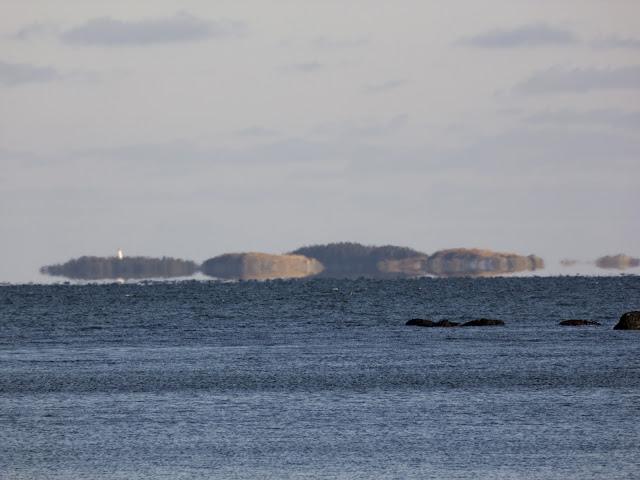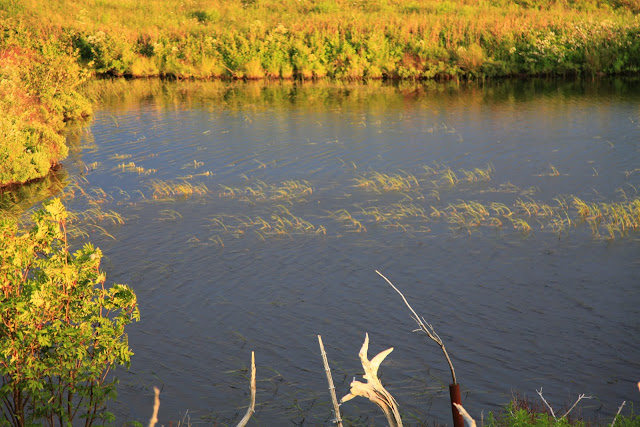

It's July 20, 1969, the day (and night) of the first lunar landing. Here's what I think I remember: I am four years old. My parents have rented a small cabin in a state park. Everything enthralls me: the peeled wooden logs stacked one on top of another, the slightly musty smell, the strange beds, the tiny hotplate in the corner, the fish someone catches and fillets--my father cooks it on a small round barbecue just outside the cabin door. I'm forbidden to step too close--it's hot!
After my younger brother and sister have gone to sleep, my father takes me for a walk. We walk along a dirt path beneath enormous pines. It is dark. The cicadas sing. Pine needles cushion our steps. The air is aromatic with pine tar and earthy scents. The moon sails overhead, following us wherever we go like a balloon on a string. My father stops in a clearing and looks up at the moon. "Men are on the moon tonight," he tells me. He seems rather excited by this idea, so I am too. I squint as hard as I can, but I can't see those men.
"Lift me up, daddy. Higher. Higher. I want to see." He lifts me onto his shoulders and we stand, looking up at the moon.
I think I remember this--my father begins to tell me about the three astronauts of the Apollo 11 mission, Neil Armstrong, Buzz Aldrin, Jr., and Michael Collins, but perhaps I've heard the adults talking about the lunar mission while my father was grilling fish. Today, July 20, 1969, is the day that the
Eagle, the lunar module with Armstrong and Aldrin inside, will split off from the spaceship, the
Columbia, and land on the moon, in the lunar region dubbed "the Sea of Tranquility." If all goes well, Armstrong and Aldrin will debark their small craft and, ensconced in their life-supporting space suits, walk around, take pictures, and collect chunks of rock from the surface of the moon.
I'm not sure how my father knows that the lunar landing has already been successful out there in the woods. Maybe he heard the news on the car radio or from a cabin neighbour. Anyway, he seems to know. He keeps telling me that this is an historic day, a remarkable night. "There are men there, up there on the moon tonight!"
Until this moment, everyone, my father included, has always insisted that there aren't any people in or on the moon, that the moon is a rocky, barren sort of place, not on or of the earth, but something other, circling us. These are not easy notions for a child to grasp, and I do not really understand them. But I seize, readily, my father's excitement, and I desperately want to share it. I squint more and more at the moon and then there, I think I see, just on the rim, dark figures against the light.
"There they are! I see them!" I shout. "I see the men on the moon!"
My father laughs and laughs. He laughs so hard he has to swing me down to the ground. "No," he tries to explain, "you can't see them, not with your eyes." He may even have said "they cannot be seen with
the naked eye"--this was a favourite expression of his for a time. But it was too late for this instruction; I
knew that if I just peeled (my mother's expression) my naked eyes enough, I could see to and through anything.
This conviction, then and since, has caused me no end of trouble. I couldn't be an eye-witness to the lunar landing--proof positive may be found in the fact that my imaginary men on the moon looked a lot more like a moment from George Melies' 1902 film
La Voyage dans la Lune than television footage of Armstrong's small step and large leap. But for me as a child--as perhaps for Melies
and the astronauts--such "seeing" what, strictly speaking, could not be seen, was an act of will, an act of imagination that I wished might also be an act of truth-telling.

Alas, it was not.
But maybe to be a writer, particularly of fictions, is forever to dedicate yourself to the task of reconciling acts of imagination and truth-telling--one way or the other.
So, the story I have told above is true. And not. It is, as I'm sure my siblings and parents and friends will be all too happy to hear me admit, pretty well all made up. I remember the pines. And the woodsy scent. And the dark. And my father telling me, with great excitement, that there were men on the moon that night. I remember how bright the moon was, against the night sky. But everything else is cobbled in there, an unholy mixture of imagination, memory and fiction.
Until a few days ago, I didn't think of my "memory"--for I was very convinced at first that it was genuine--in such terms. In fact, in the week when newscasters started talking about the 40th anniversary of the Apollo 11 landing, I went looking to see if I had any family photos from 1969. I did have a few--they are reproduced here--and I was shocked to find, as I looked at the dates, how acutely my memory had failed me. To begin with, I'd disregarded the facts that even an elementary grasp of mathematics can supply; the year of the lunar landing, I was not four, but five. If something so obvious had eluded me, how much more of my memory was built on slippery lunar sand?
The "truth" then?



On July 20, 1969, I am five years old. In a little more than a month I will start kindergarten, the first step in what has become a long apprenticeship to school. I've learned how to ride a two-wheeler, can count quickly and easily well past ten, but cannot yet write my name. I'll do that backwards and sometimes upside-down when the time comes--a bit dyslexic then, as now. I have a brother who is three and a sister who is almost two. I want to learn to hula hoop but find it pretty hard--I don't yet know how to send my knees and shoulders in different directions. And I'm utterly sure that when I cook meals on my stove you will want to eat them. Especially if they consist strictly of raisins. I read poetry with my grandfather and dress paperdolls with my grandmother and like to make up long songs and shaggy dog stories that no one believes. (Some things never change.) My favourite gambit when asked to play the mother in neighbourhood games of "house" is the counter-proposal: "No, let's say we're all orphans and we have to run away and hide because bad people are after us." And I cover dozens of pages with scribbles that I hope are writing--they look like writing to me-- but my father and mother tell me they aren't.

I fear--then and now--that I will be forever stuck in this moment, caught between the strength of my wish and its shortfall in reality. Forty years passing, in the blink of an eye. A peeled, naked eye, boosted by corrective lenses and, nevertheless, infinitely faulty. Like those lunar images beamed back and copied, degraded, even erased by NASA.* Beyond belief--and so, because of that, perfect candidates for extreme conviction.
There's a truth here somewhere, isn't there?
 *See NPR's "Houston, We Erase the Apollo 11 Tapes" July 16, 2009, http://www.npr.org/templates/story/story.php?storyId=106637066
*See NPR's "Houston, We Erase the Apollo 11 Tapes" July 16, 2009, http://www.npr.org/templates/story/story.php?storyId=106637066
Images
Reading with Grandpa Smith, December 30, 1969
Playing with Lisa (sister) at grandparents' house, August 31, 1969
Collage of images from Georges Melies' La Voyage dans la Lune (1902)--http://www.myspace.com/georges_melies
Riding my bike & playing with Leslie (brother), March 6, 1969
Cooking [raisin] soup, (?) probably November 1969
Playing paperdolls with Grandma Smith, November 1969
Apollo 11 mission, stepdown to the moon from the Eagle, http://scienceblogs.com/startswithabang/2009/07/happy_moonday.php
and http://spaceflight.nasa.gov/history/apollo/apollo11/
Hula hooping at grandparents' house, April 6, 1969

























